Grad School Celebrates Graduates Joining Careers of Lifelong Learning
| College deans and faculty always go the extra mile to help their students, and this year for UAMS Graduate School Dean Robert E. McGehee Jr., Ph.D., that was literal.
Usually “the extra mile” involves writing a last-minute recommendation or providing a glowing reference. This year, McGehee put in the miles by driving around Central Arkansas, hand-delivering bottles of champagne in time for the virtual hooding ceremony the college held via Zoom videoconferencing.
“I’m sure it’s probably gone by now,” McGehee said. “Don’t worry, it can be symbolic.”
McGehee wanted the virtual hooding to still feel special for the students, despite all the disruptions and difficulties posed by the COVID-19 pandemic on academic life. During a normal commencement season, each college has its own celebrations. The Graduate School has a brunch, complete with a champagne toast.
“You’ll notice the bottles had a note that welcomed you to a career of lifelong learning,” McGehee said. “By joining the biomedical sciences, you’re never going to have an 8-to-4 job. You’re going to come home thinking about problem solving, you’ll be driving down the road to vacation and have the next big idea hit you upside the head and you won’t be able to stop thinking about it. It’s literally lifelong learning. I’m so excited for you.”
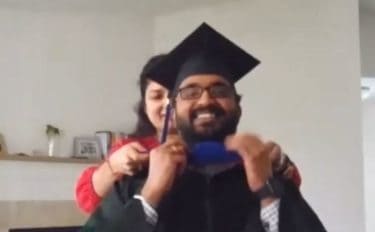
Naleen Raj Bhandari (Pharmaceutical Evaluation and
Policy) is hooded during the virtual ceremony. Adviser: Nalin Payakachat, Ph.D., M.Sc., B.Pharm. Dissertation: Burden of Living with Kidney Cancer in Older Americans
More than 130 people signed in to participate in the ceremony for about 60 graduates. In the dozens of squares on the Zoom screen, students said hello to the familiar faces of faculty, family and friends. Many had decorated their physical spaces or made festive virtual backgrounds to enhance the sense of celebration.
McGehee said it’s important at any graduation celebration – in person or virtual – to recognize the students, their family and the faculty. Those key players are necessary for any successful effort to earn a Ph.D. – the highest of academic pursuits.
“Some of these Ph.D. students have been here for years, and it’s not because they’re slow, it’s because of the amazing amount of work that goes into researching and developing and testing and carrying out and publishing brand new, cutting-edge work in the health sciences. It’s not an easy thing to do,” McGehee said.
Of the family members, McGehee said their support is invaluable.
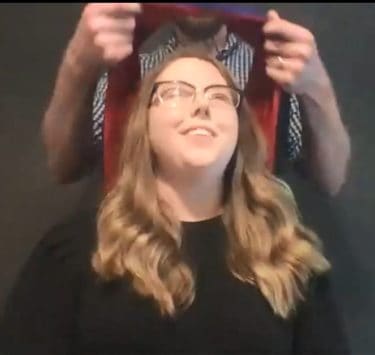
Katelynn Rose Brann (Microbiology and Immunology) Adviser: Daniel E. Voth, Ph.D. Dissertation: Characterizing the Human Macrophage Response to Diverse Bacterial Pulmonary Pathogens
“I really want to applaud and thank all of you family members,” McGehee said. “The students don’t come through this process in a vacuum. It takes a tremendous amount of help and support.”
In thanking the faculty, McGehee noted that the Graduate School is a special place. All of the faculty have other clinical or research duties and responsibilities to different colleges. So that means that in addition to everything else they have on their plates, they dedicate their time to mentoring the next generation of researchers because they feel a passion for doing so.
“What graduate faculty do is pay it forward,” McGehee said. “They love being a part of teaching the next generation and ushering students into their careers. I tell you, we’re a small graduate school, but our faculty have the biggest hearts.”
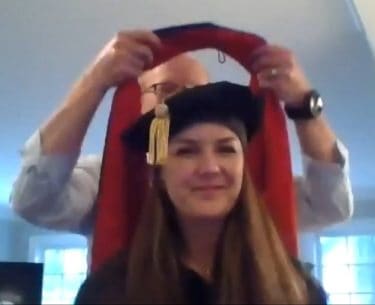
Natalie Jacqueline Pate Capps (Nursing Science) Adviser: Sarah J. Rhoads, Ph.D., D.P., W.H.N.P.-B., F.A.A.N, M.N.Sc., B.S.N. Dissertation: Smoke Exposure and Cervical Cancer: Analysis of the National Health and Nutrition Examination Survey
This includes advisers, committee members, teachers, publication proofers and more. The fact that the faculty come from across campus exposes students to the entire spectrum of the health sciences and gives them access to the expertise they need.
To demonstrate the breadth of learning in the Graduate School, McGehee picked a few student dissertations to highlight, including ones on: kidney cancer, osteoporosis, thyroid and breast cancers, the effect of the Medicaid expansion program in Arkansas, staph infections, patient falls and melanoma.
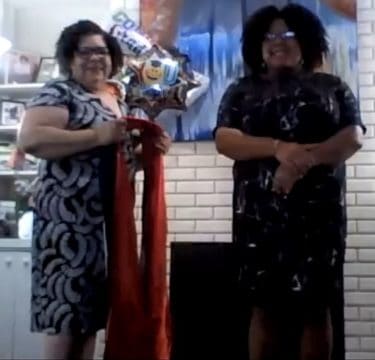
Keisha M. M. Cawley (Interdisciplinary Biomedical
Sciences) Adviser: Charles A. O’Brien, Ph.D.,
B.A. Dissertation: Osteoprotegerin in Bone Biology: Investigation of Cellular Sources and Mechanisms of
Regulation
“That just gives you a taste – it’s everything from the big picture down to tiny nanoparticles,” McGehee said.
The group watched video messages from Gov. Asa Hutchinson and UAMS Chancellor Cam Patterson, M.D., MBA.
“This isn’t the way you dreamed you would make history, but here you are,” Hutchinson said. “The COVID-19 pandemic is a historic event and your graduation is part of it. But this is only the first chapter of the history you’re going to live out.
“We will be talking about COVID-19 for a long time, no area of life has escaped its touch, but we will look back from the other side of this and see it brought out the best of us.”
Patterson said the graduates are poised to impact health care in Arkansas and beyond.
“Our virtual congratulations don’t diminish your achievements,” Patterson said. “Instead, this underscores the charge you carry forward into your career. Because of the conditions you graduate under, the Class of 2020 will be long remembered in the history of UAMS. We appreciate the grace and resiliency you showed when you adapted to the changes in your educational activities caused by this public health emergency.
“Thanks to your diligence and determination, you stand at the juncture of this high academic achievement and your professional career. You’re prepared and ready to accomplish great things.”
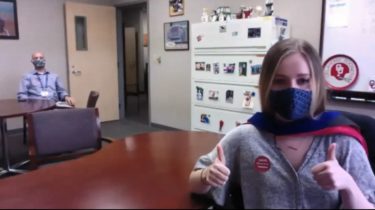
Amanda Lynn Dragan (foreground) (Interdisciplinary Biomedical Sciences) Adviser: Daniel E. Voth, Ph.D. (background) Dissertation: Defining Coxiella Burnetii Human Alveolar Infection and Activation of Host Nrf2
Signaling
McGehee acknowledged that the challenges caused by the pandemic will likely continue for some time.
“But at the same time, we’re very resilient and we survive,” McGehee said. “I can’t think of a better place to be employed than the health care industry as a whole and being involved in the discovery of better ways to do things, the development of new drugs. You will do amazing things.”
He noted that in the most uncertain days of the pandemic in mid-March when students and faculty were sent home and activities ground to a halt, many students stepped up to help with different pandemic-related needs on campus. They volunteered to screen employees and patients at the hospital entrances, manned the COVID-19 phone hotline for screening patients, and helped with contact tracing for sick patients.

Laura E. Ewing (Interdisciplinary Biomedical
Sciences) Advisers: Igor Koturbash, M.D., Ph.D.; Annie Lumen, Ph.D. Dissertation: Determinants of Radiation-Induced Gastrointestinal Toxicity
In the lab, they helped the Arkansas Department of Health and UAMS Pathology Department run COVID-19 testing for Arkansas and the helped develop a COVID ELISA antibody assay for the detection of serum antibodies. While acknowledging the efforts of many, he specifically mentioned the efforts of Katelynn Doiron, Amanda Dragan, Laura Ewing and Tiffany Miles.
McGehee ended by reading the poem “The Road Not Taken” by Robert Frost.
“And now what I would like to do – it’s not exactly a champagne glass – is propose a toast,” McGehee said. “To the Class of 2020: Success isn’t just about what you accomplish in life, it’s what you inspire others to do. And so my toast for each of you: may you live an inspirational life.”



